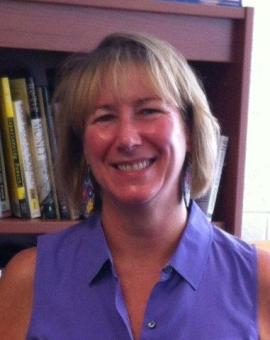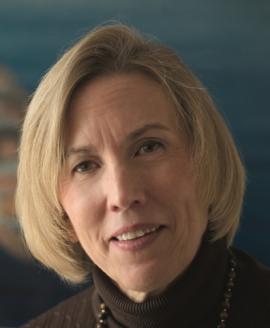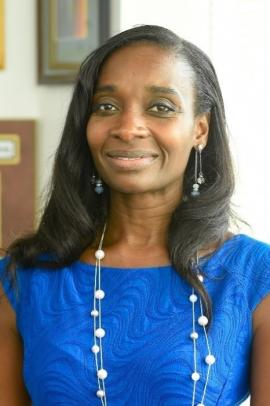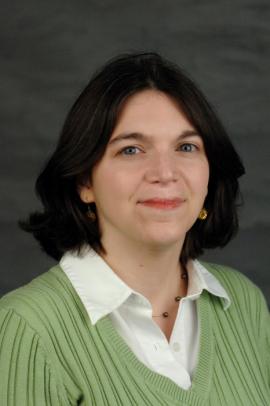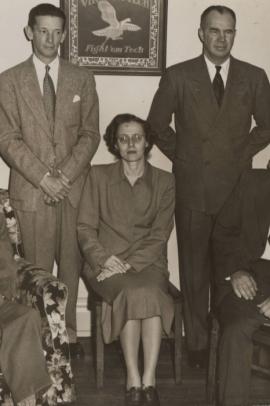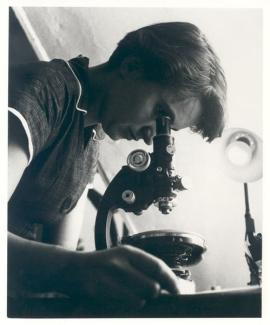(Re)Envisioning the Academic Landscape
The use of public space defines a culture's values and beliefs. This site is dedicated to enhancing the positive visibility of women in STEM on ODU's campus and recognizing their pioneering roles.
ODU Faculty Women in STEM
Mona J.E. Danner, Ph.D., Professor of Sociology and Criminal Justice
Dr. Danner received her B.A. in Administration of Justice and in Psychology from the University of Missouri-Kansas City, her M.A. in Criminology and Corrections from Sam Houston State University, and her Ph.D. in Sociology: Justice from American University. Arriving at Old Dominion University in 1993 to take up a tenure-track position, Dr. Danner rose through the ranks to become a tenured full professor in 2007. She has held numerous administrative posts at ODU and is currently Chair of the Department of Sociology and Criminal Justice.
Dr. Danner was born and raised in Kansas City, Missouri, and was not only a first-generation college student but describes herself as "first generation off the farm," meaning that both sets of her grandparents were farmers and she spent summers and many weekends with them. As a child she was interested in science and people. Motivated by strong family values and a Catholic background that emphasized service and responsibility to others, Dr. Danner chose to study psychology, sociology, and criminal justice as avenues of understanding the world and making it better.
As a scholar Dr. Danner studies social inequality and its links to public policy. She examines justice and crime distribution as a means of understanding inequality and public policing. Her work explores gender, race, class, and nativity status and the distribution of socially valued resources such as income, education, and health care. She takes an intersectional approach to these categories and considers the impact of globalization on inequality. Dr. Danner has published over 50 scholarly articles and chapters in major peer-reviewed journals and books along with numerous technical reports and one co-written book, Using Focus Groups to Listen, Learn, and Lead in Higher Education (Stylus Publishing, 2018). One article, "Three Strikes and It's Women Who Are Out: The Hidden Consequences for Women of Criminal Justice Report," published in Crime Control and Women: Feminist Implications of Criminal Justice Policy in 1998, is considered an important contribution to feminist criminal justice public policy and has been republished numerous times.
Teaching and mentoring are important aspects of Dr. Danner's work at ODU as she excels in the classroom and is a strong advocate for women's rights. In her department she revised the curriculum on social stratification to focus more specifically on social inequality. She was also the founding director of the Ph.D. program in Criminal Justice (2007-2012). When asked what she was most proud of as a scholar-teacher-mentor, she replied, "helping women learn to negotiate and enhance life skills that advance their situations within academia." She notes that women often have little experience in negotiating contracts tied to money or workload. Dr. Danner thus addresses "why" money matters, and offers workshops and seminars for women faculty and graduate students to coach them in the art of negotiation, thereby targeting the gender and wage imbalances that are endemic in higher education. She has been a leader with ODU's Women's Caucus since coming to ODU as well as in a number of professional organizations within her discipline, including the American Society of Criminology.
For more on Dr. Danner please click here for her directory listing.
Cynthia Jones, Ph.D., Professor and Eminent Scholar, Department of Ocean & Earth Sciences
Dr. Jones received her B.A. in Zoology from Boston University and her M.S. and Ph.D. in Oceanography from the University of Rhode Island. She arrived at Old Dominion University in 1986 to take a temporary position in the Department of Oceanography. From 1986 to 1996 she was associate director of ODU's Applied Marine Research Laboratory. She attained the rank of full professor in 1998 and that same year was named director of the Center for Quantitative Fisheries Ecology. The center, which she conceived, is known as a world leader in the field of fisheries.
Dr. Jones was raised in New York's Westchester County, known for its excellent school systems. Her teenage years were the era of Jacques Cousteau that inspired the magic of undersea adventure. At 16, she took scuba lessons at the Central Y in New York City, later doing her open-water dive in Long Island Sound. Drawn to oceanography, she started working in a lab as a second-semester freshman at Boston University and continued through her senior year. That experience taught her the value of research, and she was hooked.
As a scholar Dr. Jones was among the first scientists to validate the use of daily increments to age larval and juvenile fish. She was the co-leader in formalizing the use of proper statistics to develop surveys of recreational fishing. She invented a statistic with her colleague Dr. Douglas Robson that is now used worldwide and co-wrote a book on angler survey methods that is considered the bible of the field. Along with Dr. Steven Campana, she pioneered the use of trace-element chemistry of fish otoliths (earbones) to uncover the fish's natal location and movement thereafter; this technique is now used around the world. Dr. Jones has written or co-written more than 90 peer-reviewed journal articles. Her books include Sea Turtle Status and Trends: Integrating Demography and Abundance (National Academies Press, 2010) and Science and its role in the National Marine Fisheries Service (National Academies Press, 2002).
A great challenge throughout Dr. Jones's career has been dealing with discrimination. Early on, women were not allowed on research vessels or fishing boats because they were considered "bad luck." The dean of her graduate school stated that he did not know why the school wasted money on women because they only got married and had children. To counter these challenges, Dr. Jones relates, "I always had strong friendships with other women scientists, and I had the great good fortune to have a brilliant, world-renowned post-doctoral advisor who couldn't have cared a whit about what gender or race you were, but enormously valued the intelligence and creativity you had. That was my first encounter with such a mentor, and we worked together for the remainder of his life." Things have improved somewhat for women in STEM today, but even so, Dr. Jones stresses, "Things will not be equal until we see the day where women scientists have the same average number of children as their male colleagues."
Having faced discrimination herself, Dr. Jones takes seriously her role as mentor. Her lab is always a place where women and underrepresented minorities feel comfortable. It starts with being respectful of anyone she works with. She does not tolerate behavior that is not respectful. "I have been a very demanding mentor," she states. "I want the student to give me their best, and everyone has a special skill that brings value. To do one's best is also to understand that when you strive, you will also fail at times." Dr. Jones is most proud of winning the Virginia Scientist of the Year award for her research and the Carnegie Foundation award as Virginia Professor of the Year for the quality of her teaching.
For more on Dr. Jones please click here for her directory listing.
Gymama Slaughter, Ph.D., Associate Professor of Electrical and Computer Engineering and Executive Director, Frank Reidy Center for Bioelectrics
Dr. Slaughter received her B.S. in Chemistry, M.S. in Chemical Engineering, and Ph.D. in Electrical and Computer Engineering from Virginia Commonwealth University. She was a faculty member at Virginia State University and the University of Maryland, Baltimore County. She served as the Executive Director of Richmond Minorities in Engineering Partnership and was a visiting scholar and senior fellow at the Naval Research Laboratory Center for Bio/Molecular Science and Engineering (Sabbatical Leave Program). In 2018, Dr. Slaughter came to Old Dominion University to take up the position of Executive Director of the Frank Reidy Research Center for Bioelectrics. She is also the Director of the NIH Graduate Research Training Initiative for Student Enhancement (G-RISE) at Old Dominion University.
Dr. Slaughter was born in Dansoman, a town in the Greater Accra Region of Ghana. She came to the United States at the age of 12 because her parents wanted to provide their children with more educational opportunities. They encouraged her to pursue her "wildest" dreams. Dr. Slaughter was drawn to medicine at a young age and thought of becoming a doctor to help people but struggled to get through dissection experiments. As the oldest daughter of eight children, she learned to cook as a young girl, and that interest in cooking led her to switch majors from biology to chemistry, where she felt more comfortable with titrations and material synthesis labs. The fascination with medicine never left Dr. Slaughter, however, and she focused her graduate and post-doctoral research on biological systems and developing technologies to enhance human health.
Dr. Slaughter's research centers on the integration of micro and nanofabrication concepts with life science principles, with the goal of developing innovative devices that deliver therapeutics to target sites within the body, thus enabling the body to heal. When asked what she was most proud of as a scholar, Dr. Slaughter responded, "Developing devices to improve people's lives." For Dr. Slaughter this means exploring ways to harness the body's biochemical energy to power wireless implantable biosensors. These sensors would continuously monitor metabolic activity, such as glucose levels in the case of diabetics. This sort of bioelectrical innovation would also free patients from the need to prick their fingers and allow for the continuous monitoring of blood sugar levels with data delivered to smartphones without the need for batteries. "While we haven't quite glimpsed that 'fantastic voyage,'" Dr. Slaughter states in reference to a longed-for technology that many scientists theorize would allow swallowable bots to perform surgery, "we are greatly expanding treatment options through electronics and embedded systems of sensors and actuators. And we want to get them out of the lab and into the clinics and consumer markets." Dr. Slaughter is at the forefront of technological innovation. She has published over 90 peer-reviewed articles, has received grant awards in excess of $16.5 million, and is an associate editor of the IEEE Sensors Journal, published by the Institute of Electrical and Electronic Engineers.
Dr. Slaughter is strongly committed to teaching and mentoring excellence and is the recipient of the National Science Foundation's prestigious CAREER Award, which recognizes scholar-teachers who combine research and student learning. She is focused on mentoring underrepresented minority students in her lab and lets them know she has their backs and is behind them 100 percent. "Women students in particular need specific mentoring because it is still very difficult for women in engineering," she states. "Women have to be assertive to succeed," she explains, "but there is often backlash." In her most recent accomplishment, she was awarded the NIH G-RISE grant to build capacity of underrepresented students obtaining PhDs and employment in the biomedical research field, thereby providing access and opportunity in STEM education and equity in the biomedical research workforce. This is the first graduate student research training program at ODU, surely only one of many firsts for Dr. Slaughter.
For more on Dr. Slaughter please click here to view her directory listing OR here to view her profesional site.
Michele C. Weigle, Ph.D., Professor of Computer Science
Dr. Michele Weigle received her B.S. in Computer Science from Northeast Louisiana University, and her M.S. and Ph.D. in Computer Science from the University of North Carolina at Chapel Hill. She held positions at UNC-Chapel Hill and Clemson University before coming to Old Dominion University in 2006 to take up a tenure-track post. Dr. Weigle was tenured and promoted and became a full professor of Computer Science in 2018. At Old Dominion University she served as Graduate Program Director for Computer Science from 2013 to 2019 and currently sits on the editorial boards of the Journal of the Association for Information Science and Technology and the International Journal of Digital Libraries.
Dr. Weigle was born and raised in St. Francisville, a small town in Louisiana. A "child of the 1980s," she was drawn to Atari and Commodore 64 systems and always had a computer in her room. Through gifted education classes she learned Logo and BASIC on the Apple II computers at her elementary school and enjoyed the order and structure programming required. Dr. Weigle began to study computer science seriously in high school and chose it as her major in college. She embraces the philosophy of computer scientists as "toolsmiths" who help other researchers do their work better, an idea advocated by Dr. Fred Brooks, who founded the CS department at UNC. She also has a strong interest in teaching, stating, "I've always loved learning new things and then thinking about how to explain those things to other people."
Dr. Weigle's research interests include information visualization, web science, digital preservation, and social media. Her specialization is web archiving, and she studies how web pages have been archived in independent public and private archival sites. Web archives record the vast content of web pages including HTML and JavaScript sources as well as images and stylesheets, which allow for user interaction with archived material. For example, lawyers access web archives for use in court cases while humanities scholars study them to document the history of the web and of the recent past. Dr. Weigle collaborates with historians and libraries in projects uniting STEM and humanities scholars in order to develop analytical tools to study web archives, explore how web pages have changed over time, and develop ways to enable access to past web pages and preserve them. She has published over 100 articles in peer-reviewed conferences and journals and has served as PI or Co-PI on external research grants totaling over $3.3 million from the National Science Foundation, the National Endowment for the Humanities, the Institute of Museum and Library Services, and the Andrew W. Mellon Foundation.
When asked to consider the challenges she confronted as a woman in her discipline, Dr. Weigle cites the lack of visibility of women in the STEM fields as the biggest problem. She explains that as an undergraduate she met Dr. Krissten Cooper, who was Chair of the Department of Computer Science at her university and who would often relay stories of what it was like to be a lone woman in science. Cooper was an engaging and encouraging mentor who always boosted Dr. Weigle's confidence. Once Dr. Weigle began her graduate work, however, women were less visible, as there were no tenure-track female faculty members in the department. She never saw a woman defend a dissertation in computer science while she was pursuing her own degree, and the male faculty seemed shocked when this observation was made. Even so, she had Dr. Cooper's example to follow, and Dr. Weigle formed a tight-knit network of female graduate students for support. Today, Dr. Weigle underscores that the visibility of women in STEM remains paramount. She is proud that about 30 percent of ODU's computer science graduate students are women, and as a mentor she practices reaching out to these students, providing encouragement, and helping them recognize their abilities and accomplishments.
For more on Dr. Weigle please click here for her directory listing.
Mona J.E. Danner, Ph.D., Professor of Sociology and Criminal Justice
Dr. Danner received her B.A. in Administration of Justice and in Psychology from the University of Missouri-Kansas City, her M.A. in Criminology and Corrections from Sam Houston State University, and her Ph.D. in Sociology: Justice from American University. Arriving at Old Dominion University in 1993 to take up a tenure-track position, Dr. Danner rose through the ranks to become a tenured full professor in 2007. She has held numerous administrative posts at ODU and is currently Chair of the Department of Sociology and Criminal Justice.
Dr. Danner was born and raised in Kansas City, Missouri, and was not only a first-generation college student but describes herself as "first generation off the farm," meaning that both sets of her grandparents were farmers and she spent summers and many weekends with them. As a child she was interested in science and people. Motivated by strong family values and a Catholic background that emphasized service and responsibility to others, Dr. Danner chose to study psychology, sociology, and criminal justice as avenues of understanding the world and making it better.
As a scholar Dr. Danner studies social inequality and its links to public policy. She examines justice and crime distribution as a means of understanding inequality and public policing. Her work explores gender, race, class, and nativity status and the distribution of socially valued resources such as income, education, and health care. She takes an intersectional approach to these categories and considers the impact of globalization on inequality. Dr. Danner has published over 50 scholarly articles and chapters in major peer-reviewed journals and books along with numerous technical reports and one co-written book, Using Focus Groups to Listen, Learn, and Lead in Higher Education (Stylus Publishing, 2018). One article, "Three Strikes and It's Women Who Are Out: The Hidden Consequences for Women of Criminal Justice Report," published in Crime Control and Women: Feminist Implications of Criminal Justice Policy in 1998, is considered an important contribution to feminist criminal justice public policy and has been republished numerous times.
Teaching and mentoring are important aspects of Dr. Danner's work at ODU as she excels in the classroom and is a strong advocate for women's rights. In her department she revised the curriculum on social stratification to focus more specifically on social inequality. She was also the founding director of the Ph.D. program in Criminal Justice (2007-2012). When asked what she was most proud of as a scholar-teacher-mentor, she replied, "helping women learn to negotiate and enhance life skills that advance their situations within academia." She notes that women often have little experience in negotiating contracts tied to money or workload. Dr. Danner thus addresses "why" money matters, and offers workshops and seminars for women faculty and graduate students to coach them in the art of negotiation, thereby targeting the gender and wage imbalances that are endemic in higher education. She has been a leader with ODU's Women's Caucus since coming to ODU as well as in a number of professional organizations within her discipline, including the American Society of Criminology.
For more on Dr. Danner please click here for her directory listing.
Cynthia Jones, Ph.D., Professor and Eminent Scholar, Department of Ocean & Earth Sciences
Dr. Jones received her B.A. in Zoology from Boston University and her M.S. and Ph.D. in Oceanography from the University of Rhode Island. She arrived at Old Dominion University in 1986 to take a temporary position in the Department of Oceanography. From 1986 to 1996 she was associate director of ODU's Applied Marine Research Laboratory. She attained the rank of full professor in 1998 and that same year was named director of the Center for Quantitative Fisheries Ecology. The center, which she conceived, is known as a world leader in the field of fisheries.
Dr. Jones was raised in New York's Westchester County, known for its excellent school systems. Her teenage years were the era of Jacques Cousteau that inspired the magic of undersea adventure. At 16, she took scuba lessons at the Central Y in New York City, later doing her open-water dive in Long Island Sound. Drawn to oceanography, she started working in a lab as a second-semester freshman at Boston University and continued through her senior year. That experience taught her the value of research, and she was hooked.
As a scholar Dr. Jones was among the first scientists to validate the use of daily increments to age larval and juvenile fish. She was the co-leader in formalizing the use of proper statistics to develop surveys of recreational fishing. She invented a statistic with her colleague Dr. Douglas Robson that is now used worldwide and co-wrote a book on angler survey methods that is considered the bible of the field. Along with Dr. Steven Campana, she pioneered the use of trace-element chemistry of fish otoliths (earbones) to uncover the fish's natal location and movement thereafter; this technique is now used around the world. Dr. Jones has written or co-written more than 90 peer-reviewed journal articles. Her books include Sea Turtle Status and Trends: Integrating Demography and Abundance (National Academies Press, 2010) and Science and its role in the National Marine Fisheries Service (National Academies Press, 2002).
A great challenge throughout Dr. Jones's career has been dealing with discrimination. Early on, women were not allowed on research vessels or fishing boats because they were considered "bad luck." The dean of her graduate school stated that he did not know why the school wasted money on women because they only got married and had children. To counter these challenges, Dr. Jones relates, "I always had strong friendships with other women scientists, and I had the great good fortune to have a brilliant, world-renowned post-doctoral advisor who couldn't have cared a whit about what gender or race you were, but enormously valued the intelligence and creativity you had. That was my first encounter with such a mentor, and we worked together for the remainder of his life." Things have improved somewhat for women in STEM today, but even so, Dr. Jones stresses, "Things will not be equal until we see the day where women scientists have the same average number of children as their male colleagues."
Having faced discrimination herself, Dr. Jones takes seriously her role as mentor. Her lab is always a place where women and underrepresented minorities feel comfortable. It starts with being respectful of anyone she works with. She does not tolerate behavior that is not respectful. "I have been a very demanding mentor," she states. "I want the student to give me their best, and everyone has a special skill that brings value. To do one's best is also to understand that when you strive, you will also fail at times." Dr. Jones is most proud of winning the Virginia Scientist of the Year award for her research and the Carnegie Foundation award as Virginia Professor of the Year for the quality of her teaching.
For more on Dr. Jones please click here for her directory listing.
Gymama Slaughter, Ph.D., Associate Professor of Electrical and Computer Engineering and Executive Director, Frank Reidy Center for Bioelectrics
Dr. Slaughter received her B.S. in Chemistry, M.S. in Chemical Engineering, and Ph.D. in Electrical and Computer Engineering from Virginia Commonwealth University. She was a faculty member at Virginia State University and the University of Maryland, Baltimore County. She served as the Executive Director of Richmond Minorities in Engineering Partnership and was a visiting scholar and senior fellow at the Naval Research Laboratory Center for Bio/Molecular Science and Engineering (Sabbatical Leave Program). In 2018, Dr. Slaughter came to Old Dominion University to take up the position of Executive Director of the Frank Reidy Research Center for Bioelectrics. She is also the Director of the NIH Graduate Research Training Initiative for Student Enhancement (G-RISE) at Old Dominion University.
Dr. Slaughter was born in Dansoman, a town in the Greater Accra Region of Ghana. She came to the United States at the age of 12 because her parents wanted to provide their children with more educational opportunities. They encouraged her to pursue her "wildest" dreams. Dr. Slaughter was drawn to medicine at a young age and thought of becoming a doctor to help people but struggled to get through dissection experiments. As the oldest daughter of eight children, she learned to cook as a young girl, and that interest in cooking led her to switch majors from biology to chemistry, where she felt more comfortable with titrations and material synthesis labs. The fascination with medicine never left Dr. Slaughter, however, and she focused her graduate and post-doctoral research on biological systems and developing technologies to enhance human health.
Dr. Slaughter's research centers on the integration of micro and nanofabrication concepts with life science principles, with the goal of developing innovative devices that deliver therapeutics to target sites within the body, thus enabling the body to heal. When asked what she was most proud of as a scholar, Dr. Slaughter responded, "Developing devices to improve people's lives." For Dr. Slaughter this means exploring ways to harness the body's biochemical energy to power wireless implantable biosensors. These sensors would continuously monitor metabolic activity, such as glucose levels in the case of diabetics. This sort of bioelectrical innovation would also free patients from the need to prick their fingers and allow for the continuous monitoring of blood sugar levels with data delivered to smartphones without the need for batteries. "While we haven't quite glimpsed that 'fantastic voyage,'" Dr. Slaughter states in reference to a longed-for technology that many scientists theorize would allow swallowable bots to perform surgery, "we are greatly expanding treatment options through electronics and embedded systems of sensors and actuators. And we want to get them out of the lab and into the clinics and consumer markets." Dr. Slaughter is at the forefront of technological innovation. She has published over 90 peer-reviewed articles, has received grant awards in excess of $16.5 million, and is an associate editor of the IEEE Sensors Journal, published by the Institute of Electrical and Electronic Engineers.
Dr. Slaughter is strongly committed to teaching and mentoring excellence and is the recipient of the National Science Foundation's prestigious CAREER Award, which recognizes scholar-teachers who combine research and student learning. She is focused on mentoring underrepresented minority students in her lab and lets them know she has their backs and is behind them 100 percent. "Women students in particular need specific mentoring because it is still very difficult for women in engineering," she states. "Women have to be assertive to succeed," she explains, "but there is often backlash." In her most recent accomplishment, she was awarded the NIH G-RISE grant to build capacity of underrepresented students obtaining PhDs and employment in the biomedical research field, thereby providing access and opportunity in STEM education and equity in the biomedical research workforce. This is the first graduate student research training program at ODU, surely only one of many firsts for Dr. Slaughter.
For more on Dr. Slaughter please click here to view her directory listing OR here to view her profesional site.
Michele C. Weigle, Ph.D., Professor of Computer Science
Dr. Michele Weigle received her B.S. in Computer Science from Northeast Louisiana University, and her M.S. and Ph.D. in Computer Science from the University of North Carolina at Chapel Hill. She held positions at UNC-Chapel Hill and Clemson University before coming to Old Dominion University in 2006 to take up a tenure-track post. Dr. Weigle was tenured and promoted and became a full professor of Computer Science in 2018. At Old Dominion University she served as Graduate Program Director for Computer Science from 2013 to 2019 and currently sits on the editorial boards of the Journal of the Association for Information Science and Technology and the International Journal of Digital Libraries.
Dr. Weigle was born and raised in St. Francisville, a small town in Louisiana. A "child of the 1980s," she was drawn to Atari and Commodore 64 systems and always had a computer in her room. Through gifted education classes she learned Logo and BASIC on the Apple II computers at her elementary school and enjoyed the order and structure programming required. Dr. Weigle began to study computer science seriously in high school and chose it as her major in college. She embraces the philosophy of computer scientists as "toolsmiths" who help other researchers do their work better, an idea advocated by Dr. Fred Brooks, who founded the CS department at UNC. She also has a strong interest in teaching, stating, "I've always loved learning new things and then thinking about how to explain those things to other people."
Dr. Weigle's research interests include information visualization, web science, digital preservation, and social media. Her specialization is web archiving, and she studies how web pages have been archived in independent public and private archival sites. Web archives record the vast content of web pages including HTML and JavaScript sources as well as images and stylesheets, which allow for user interaction with archived material. For example, lawyers access web archives for use in court cases while humanities scholars study them to document the history of the web and of the recent past. Dr. Weigle collaborates with historians and libraries in projects uniting STEM and humanities scholars in order to develop analytical tools to study web archives, explore how web pages have changed over time, and develop ways to enable access to past web pages and preserve them. She has published over 100 articles in peer-reviewed conferences and journals and has served as PI or Co-PI on external research grants totaling over $3.3 million from the National Science Foundation, the National Endowment for the Humanities, the Institute of Museum and Library Services, and the Andrew W. Mellon Foundation.
When asked to consider the challenges she confronted as a woman in her discipline, Dr. Weigle cites the lack of visibility of women in the STEM fields as the biggest problem. She explains that as an undergraduate she met Dr. Krissten Cooper, who was Chair of the Department of Computer Science at her university and who would often relay stories of what it was like to be a lone woman in science. Cooper was an engaging and encouraging mentor who always boosted Dr. Weigle's confidence. Once Dr. Weigle began her graduate work, however, women were less visible, as there were no tenure-track female faculty members in the department. She never saw a woman defend a dissertation in computer science while she was pursuing her own degree, and the male faculty seemed shocked when this observation was made. Even so, she had Dr. Cooper's example to follow, and Dr. Weigle formed a tight-knit network of female graduate students for support. Today, Dr. Weigle underscores that the visibility of women in STEM remains paramount. She is proud that about 30 percent of ODU's computer science graduate students are women, and as a mentor she practices reaching out to these students, providing encouragement, and helping them recognize their abilities and accomplishments.
For more on Dr. Weigle please click here for her directory listing.
ODU Women Faculty Emeriti in STEM
Ms. Margaret Casto Phillips, (1914-2009), Professor Emeritus of Mathematics
Ms. Phillips received her bachelor's degree from Marshall University and her master's degree from Duke University. She taught in the mining town of Logan, West Virginia, for nine years in the public school system before taking up a position at Elon College in North Carolina. She came to Norfolk, Virginia, in 1943. During World War II the military needed physics instructors, so Ms. Phillips secured short-term contracts through the Norfolk Division of the College of William and Mary and the University of Virginia to teach physics to U.S. Army and U.S. Navy personnel. In 1945 she became a permanent employee of "The Division" that eventually became Old Dominion College in 1962 and Old Dominion University in 1969, where she taught primarily in the math department but sometimes in the physics department. She rose through the ranks and was made a full professor in 1965. Professor Phillips served as Chair of the Department of Mathematics in the mid-1960s and retired in 1979.
Ms. Phillips began at the Norfolk Division when the school consisted of just two buildings, the "Old Larchmont Elementary School" (razed in 1975) and a new Administration Building, now known as Rollins Hall. In those days faculty and students came to campus via streetcars and ferries, and telephones had not yet been installed. She remembered in an interview conducted in 1982 and now housed in the University Archives that four Quonset huts were erected as classroom space just after World War II and were heated by coal-burning stoves. By the time Professor Phillips retired, the massive quad anchored by Webb Center was in place and a focal point of the University landscape, and modern brick buildings had been erected.
The picture of Margaret Phillips reveals that she was one of only a few pioneering women teaching in the STEM disciplines during her career. In the archived interview she said that she became chair by accident because the man selected for the position died unexpectedly of a heart attack. "[I]t was so close to the opening of school and the market was tight ... and [the administration] had to make a selection quickly for a department chairman. So they asked if I would take it until Christmas and I ended up - it was two years before we got a replacement."
As a woman in STEM, Professor Phillips promoted math and physics in multiple ways. She taught legions of students, many of whom went on to have prominent careers in the sciences and academia. She encouraged early exposure to science by hosting Larchmont Elementary School third-graders in the physics lab for demonstrations, and in the early days of television she worked with the only local station to put on science shows. For several decades, Margaret Phillips volunteered with the Virginia Academy of Science whenever the organization's conventions came to Norfolk. She witnessed the expansion of math requirements after October 4, 1957, when the Soviet Union launched "Sputnik," the first artificial satellite to orbit the Earth. Sputnik triggered the Space Race in the United States in reaction to Cold War politics and led "The Division" to require all students to take some math courses, thus initiating an early STEM focus in the curriculum. Professor Phillips taught at a time when faculty were not required to publish; however, she was expected to maintain a 5/6 teaching load —five courses in the fall and six courses in the spring — representing an extraordinary contribution to the teaching mission of the institution. She also served as Old Dominion University liaison to the American Association of University Women.
Ms. Margaret Casto Phillips, (1914-2009), Professor Emeritus of Mathematics
Ms. Phillips received her bachelor's degree from Marshall University and her master's degree from Duke University. She taught in the mining town of Logan, West Virginia, for nine years in the public school system before taking up a position at Elon College in North Carolina. She came to Norfolk, Virginia, in 1943. During World War II the military needed physics instructors, so Ms. Phillips secured short-term contracts through the Norfolk Division of the College of William and Mary and the University of Virginia to teach physics to U.S. Army and U.S. Navy personnel. In 1945 she became a permanent employee of "The Division" that eventually became Old Dominion College in 1962 and Old Dominion University in 1969, where she taught primarily in the math department but sometimes in the physics department. She rose through the ranks and was made a full professor in 1965. Professor Phillips served as Chair of the Department of Mathematics in the mid-1960s and retired in 1979.
Ms. Phillips began at the Norfolk Division when the school consisted of just two buildings, the "Old Larchmont Elementary School" (razed in 1975) and a new Administration Building, now known as Rollins Hall. In those days faculty and students came to campus via streetcars and ferries, and telephones had not yet been installed. She remembered in an interview conducted in 1982 and now housed in the University Archives that four Quonset huts were erected as classroom space just after World War II and were heated by coal-burning stoves. By the time Professor Phillips retired, the massive quad anchored by Webb Center was in place and a focal point of the University landscape, and modern brick buildings had been erected.
The picture of Margaret Phillips reveals that she was one of only a few pioneering women teaching in the STEM disciplines during her career. In the archived interview she said that she became chair by accident because the man selected for the position died unexpectedly of a heart attack. "[I]t was so close to the opening of school and the market was tight ... and [the administration] had to make a selection quickly for a department chairman. So they asked if I would take it until Christmas and I ended up - it was two years before we got a replacement."
As a woman in STEM, Professor Phillips promoted math and physics in multiple ways. She taught legions of students, many of whom went on to have prominent careers in the sciences and academia. She encouraged early exposure to science by hosting Larchmont Elementary School third-graders in the physics lab for demonstrations, and in the early days of television she worked with the only local station to put on science shows. For several decades, Margaret Phillips volunteered with the Virginia Academy of Science whenever the organization's conventions came to Norfolk. She witnessed the expansion of math requirements after October 4, 1957, when the Soviet Union launched "Sputnik," the first artificial satellite to orbit the Earth. Sputnik triggered the Space Race in the United States in reaction to Cold War politics and led "The Division" to require all students to take some math courses, thus initiating an early STEM focus in the curriculum. Professor Phillips taught at a time when faculty were not required to publish; however, she was expected to maintain a 5/6 teaching load —five courses in the fall and six courses in the spring — representing an extraordinary contribution to the teaching mission of the institution. She also served as Old Dominion University liaison to the American Association of University Women.
Dedication
(Re)Envisioning the Academic Landscape is dedicated to the memory of Dr. Rosalind Franklin (1920-1958), a British chemist and X-ray crystallographer who contributed to the discovery of the double helix structure of deoxyribonucleic acid (DNA). She was also an early pioneer in virology. Dr. Franklin studied physical chemistry at Cambridge University and earned her Ph.D. in 1945. In the early 1950s Drs. James Watson and Francis Crick used Franklin's X-ray diffraction work to expose the structure of DNA. Dr. Franklin had died by 1962 when they were awarded the Nobel Prize. During her lifetime, Dr. Franklin's work was underappreciated and not always credited, but she is now acknowledged as having been one of the foremost women in STEM of the 20th century.
For more on Rosalind Franklin, please click here to see the NIH National Library of Medicine digitized collection.



